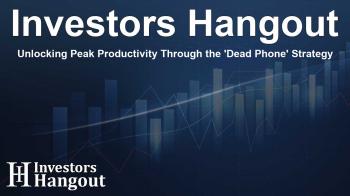Unlocking Peak Productivity Through the 'Dead Phone' Strategy

Revolutionizing Productivity with the 'Dead Phone' Strategy
Entrepreneur Alex Hormozi introduces a radical productivity approach that involves rendering his phone a "dead element". This innovative strategy stemmed from one of the toughest jobs of his career and now has become instrumental in managing his multi-million-dollar business empire.
The Unconventional 'Dead Phone' Method
Hormozi doesn't rely on complicated apps or intricate time management systems. Instead, he enforces systematic elimination of distractions. His phone becomes inaccessible via an app that blocks notifications, including text messages and calls. To regain access, he must physically distance himself from his workspace, embodying what he refers to as "true friction". This method is pivotal to his productivity levels.
The Importance of Environment
Beyond just his phone, Hormozi curates an environment free from distractions. He prefers working in spaces devoid of natural light and background noise, often utilizing earplugs and headphones simultaneously. He states, "There’s nothing else to do," emphasizing that this setup maximizes his productivity during intensive work periods.
Rethinking Breaks for Enhanced Output
Hormozi offers a fresh perspective on breaks and downtime. He explains that true productivity is about "maximizing output per unit of time," and he considers strategic breaks as enhancements to overall production. His approach includes taking brief 5-10 minute breaks following focused work sessions of 45-60 minutes.
Rest is Productive
According to Hormozi, these short breaks help refresh the mind, thereby improving subsequent work efficiency. After each break, he feels rejuvenated and ready to tackle challenges more effectively, turning what was once considered idle time into productive opportunities.
From $8-Hour Job to Entrepreneurial Success
The roots of Hormozi's extreme productivity techniques can be traced back to a challenging data entry position he held after graduating. The job paid only $8 an hour, and the environment was less than inspiring. Hormozi describes his workplace as drab, where employees felt like "zombies" and suggestions for better conditions were dismissed.
A Catalyst for Change
This experience profoundly impacted Hormozi, pushing him to avoid such monotonous roles for life. It drove his ambition toward entrepreneurship, as he sought to escape environments that stifled his creativity and growth potential.
Overcoming Distraction: The Psychology of Inertia
Hormozi delves into human behavior to explain why distractions seem to have such a strong grip on many individuals. He notes that people often perceive their current paths as more rewarding than the challenging but potentially more rewarding routes they consider pursuing. This perception creates resistance to change.
Carrots and Sticks Analogy
Using a "carrots and sticks" analogy, Hormozi notes that fear of judgment and the comfort of the familiar often keep people from making significant changes. The key, he suggests, lies in overcoming inertia, focusing on motivation rather than mere willpower.
Navigating Career Opportunities Effectively
Hormozi also shares his insights on breaking into competitive fields by adopting a supply-demand mindset. Rather than engaging in generic networking, he recommends pinpointing available roles and actively proposing to fill them. He believes that presenting oneself for specific opportunities can yield a better chance at success.
Building Relationships
His advice includes utilizing one's spare time to network proactively and develop skills within a business context. Hormozi emphasizes the importance of targeting less visible companies where there may be fewer unsolicited applications, thereby enhancing one’s chances of standing out.
The insights shared by Hormozi are a testament to a straightforward productivity philosophy, centered on the ruthless elimination of distractions that do not serve essential work. For professionals facing overwhelming digital landscapes, Hormozi’s approach serves as a powerful reminder that optimal performance often requires making challenging sacrifices, sacrifices that have distinctly influenced his journey as an entrepreneur.
Frequently Asked Questions
What is the 'Dead Phone' strategy?
The 'Dead Phone' strategy refers to rendering one's phone unusable by blocking notifications to eliminate distractions, fostering better productivity.
How long does Hormozi recommend working before taking a break?
Hormozi suggests working for 45-60 minutes followed by a short 5-10 minute break to enhance productivity.
What motivates Hormozi's productivity techniques?
Hormozi's techniques are motivated by his past experiences in unfulfilling work environments, pushing him to eliminate distractions that hinder his focus.
How can one apply Hormozi's strategies in their career?
Individuals can adopt a supply-demand approach by identifying available roles and proactively offering their services to companies.
What is the importance of environment according to Hormozi?
Hormozi believes a distraction-free environment, devoid of noise and light, is crucial for maximizing productivity during work sessions.
About The Author
Contact Owen Jenkins privately here. Or send an email with ATTN: Owen Jenkins as the subject to contact@investorshangout.com.
About Investors Hangout
Investors Hangout is a leading online stock forum for financial discussion and learning, offering a wide range of free tools and resources. It draws in traders of all levels, who exchange market knowledge, investigate trading tactics, and keep an eye on industry developments in real time. Featuring financial articles, stock message boards, quotes, charts, company profiles, and live news updates. Through cooperative learning and a wealth of informational resources, it helps users from novices creating their first portfolios to experts honing their techniques. Join Investors Hangout today: https://investorshangout.com/
The content of this article is based on factual, publicly available information and does not represent legal, financial, or investment advice. Investors Hangout does not offer financial advice, and the author is not a licensed financial advisor. Consult a qualified advisor before making any financial or investment decisions based on this article. This article should not be considered advice to purchase, sell, or hold any securities or other investments. If any of the material provided here is inaccurate, please contact us for corrections.

